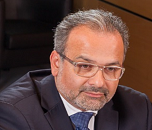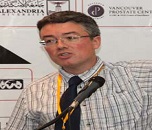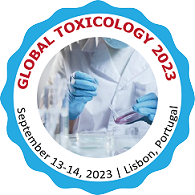Renowned Speakers

Wei Zheng
Purdue University,USA USA

Quinteros M A
CONICET Argentina

Pierre Eftekhari
Inoviem Scientific France

Cédric Wernli
University of Applied Science and Arts,Switzerland. Switzerland

Christian Bjerregaard-Olesen
Aarhus University, Denmark Denmark

Lucija Peterlin MaÅ¡iÄ
University of Ljubljana Slovenia Slovenia

Qing Xia
National Center of Biomedical Analysis China China

Christopher Dalton
Defence Science and Technology Laboratory UK UK
Recommended Global Toxicology Webinars & Conferences
Europe & UK
Asia Pacific & Middle East
Canada
GLOBAL TOXICOLOGY 2023
About Conference
We are pleased to welcome you all to 7th Global Toxicology and Risk Assessment Conference during September 13-14, 2023 Lisbon, Portugal. The conference mainly focuses on the theme “De Novo Advancements in Toxicology and Risk Assessment”. Global Toxicology 2023 provides a unique opportunity for the participants with various backgrounds to share their research ideas and to learn from other colleagues about the modern scientific improvements in the field of toxicology and interrelated disciplines. It is the extraordinary event designed for the professionals to enhance their knowledge and application of research findings in the arena of toxicology and pharmacology.
Global Toxicology 2023 offers a unique space and chances to present and evaluating the latest updates with a complete approach to different areas of attention. Toxicology mostly deals with the study of the relation between the dose and its following therapeutic effect. The therapeutic effect changes in to poisonous effect with an increase or decrease level in dosage. The toxicological studies start from the preclinical drug development. These studies are developed by advanced techniques such as In vivo imaging. There are about 1000+ Global Events conducted by Conference Series LLC Ltd inclusive of 600+ Conferences, 500+ Forthcoming and Past Symposiums and Workshops in Europe, USA & Asia with the support of more than 1000 scientific societies and publishes 700+ Open Access Journals with over 30000 eminent personalities and reputed scientists as editorial board members.
Why Global Toxicology 2023?
Here at Global Toxicology 2023 you can meet the world leading toxicologists, biochemists, pharmacologists, and also the industry giants who will provide you with the modern inventions and scientific approaches thus help you in grasping the knowledge with the updated information.
This conference will play a key role which allows latest techniques and modern methodologies in toxicology, pharmacology and genotoxicology. This conference covers all the major topics that come across like mechanisms and modes of action of various toxins, genotoxicity and mutagenicity, forensic toxicology, ecological toxicology, industrial toxicology, biomarkers, toxicology current advances, technologies, experimental toxicology, nanomaterial’s, regulatory toxicology and broad scope of toxicology and pharmacology in different fields.
Thus, our final agenda is to create a great platform which will assemble all prominent scientists at one stage who can ultimately make our event a grand success.
Target Audience:
- Toxicologists
- Pharmacologists
- Forensic Professionals
- Research scholars
- Noble laureates in toxicology
- Professors
- Students
- Pharmacists
- Toxicology Associations and Societies
- Bioinformatics Professionals
- Pharmaceutical Industrial Giants
- Clinical Laboratories and Technicians
- Criminologists
- Academicians
- Corporate Managers
- Lab Directors
- Principal Investigators and Decision makers from all corners of the Pharma, Biotech and Health Care industries across the globe.
Sessions/ Tracks
Track 1: Toxicology:
Toxicology is a division of biology, chemistry, and medicine concerned with the study of the adverse reactions of chemicals on living organisms. It also studies the harmful effects of chemical, biological and physical agents in biological systems that establish the extent of damage in living organisms. The relationship among dose and its effects on the exposed organism is of high significance in toxicology. Factors that influence chemical toxicity includes the dosage (and whether it is acute or chronic); the route of exposure, the species, age, sex and environment. Toxicologic analysis plays a very crucial role in the modern-day investigations. Basic principles of several disciplines like analytical chemistry, biochemistry, epidemiology, pharmacodynamics, pathology, and physiology are applied in such kind of analysis.
Track 2: Human Health Toxicology:
To observe the clinical effects of environmental toxicants on living organisms by collecting and analysing scientific data and identifying ways of detection and diagnosis. Human and health toxicology deals with the study of the adverse effects caused to the body xenobiotic substances. It contains a wide range of disciplines such as Organ systems toxicity, lung toxicology et al.,
The management of acute poisonings, emergencies such as accidental poisonings, suicidal attempts with various pharmaceutical drugs etc. are dealt under human toxicology. Several analytical toxicological principles are implemented in it. Techniques like gas chromatography, high performance liquid chromatography, and thin layer chromatography different kinds of extractions are employed for these studies. Health Toxicology deals with the identification of potential health hazards associated with the exposure to different chemicals and biological agents, their identification, assessment and steps to curtail them. It’s the toxicological science which deals with the structure-function relationship, human and health sways of the chemicals such as PCBs etc. Other trace elements in human nutrition and health are also assessed.
Track 3: Toxic genomic :
Toxic genomic In this report, toxic genomic is well-defined as the application of genomic technologies (for example, genetics, genome sequence analysis, gene expression profiling, proteomics, metabolomics, and related approaches) to study the adverse effects of environmental and pharmaceutical chemicals on human health and the environment. Researchers, regulators, and the public all desire efficient and correct methods to assess the toxicologic effects of chemical, physical, and biologic agents on living systems. Yet, no single approach happens to analyse toxicologic responses, a tough task given the complexity of human and animal physiology and individual variations. The genomic information and novel technologies that have appeared in the post-genomic time promise to inform the thoughtful of many risks as well as enlighten current approaches and lead to novel predictive approaches for studying disease risk.
Track 4: Ecological Risk Assessment:
An ecological risk assessment is the process for evaluating how likely it is that the environment may be influenced as a result of revelation to one or more environmental stressors like chemicals, land change, disease, invasive species and climate change. Environmental Risk Assessment (ERA) aims to evaluate the effects of stressors, generally chemicals, on the specific environment. A risk is an integrated evaluation of likelihood and severity of an unsought event. In ERA, the unsought event often depends on the chemical of interest and on the risk assessment scenario.
Track 5: Chemical Toxicology :
Toxicology is the study of death-dealing and harmful substances. Toxicity examining permits us to identify the toxicity of chemicals we use and gives information about the potency of their effects. As well as being faithful for industrial chemicals this is also faith of pharmaceuticals and the natural products formed by plants, bacteria and fungi. Signifying anyhow a chemical can cause cancer, allergic reactions or abnormalities in unborn children is important to human health, and the process of discovering this information is known as assessment of hazard. This process is different from assessing risk which controls whether it is likely to actually cause problem in a given situation
Track 6: Behaviour Toxicology :
The new fields of activity material medical and activity embryology investigate the result of specific hepatotoxic exposures in humans and animals on learning, memory, and activity characteristics. 3 vital categories of activity neurotoxic ants are metals, solvents, and pesticides. The clearest knowledge on the hurtful effects of antenatal exposure to toxicants comes from the study of 2 metals, lead and mercury, and from epidemiologic investigations of the results of alcohol taken throughout maternity. The less complete knowledge is on the market for 2 alternative teams of agents, solvents and pesticides. What we tend to do to realize their effects on the vertebrate brain is convincing enough to form U.S.A. demand caution in their distribution.
- Insomia.
- sedation.
- Impaired Pyschomotor activity.
Track 7: Pharmacology :
Pharmacological studies involve examining the interactions between chemical substances and living systems, with a read to decisive the properties of medicine and drug actions, as well as the drug molecules and drug receptors interactions and the way these interactions elicit an impact. The study of chemicals needs sensible information of the biological system affected. With the information of organic chemistry and cell biology increasing, the sector of material medical has conjointly modified considerably. it is currently doable to style chemicals that act on specific cellular communication or metabolic pathways by moving sites directly on cell-surface receptors, through molecular analysis of receptors.
- Geriatric material medical
- Biochemical material medical
- Paediatric material medical
- Psychopharmacology
- Respiratory material medical
- Neuropharmacology
- Clinical material medical
Track 8: Microbial Toxicology :
Microbial toxins square measure toxins created by microorganisms, together with microorganisms and fungi. Microorganism toxins promote infection and illness by directly damaging host tissues and by disabling the system. The poison is caused by botulin, a kind of microorganism. Whereas pharmacological medicine is closely associated with the adverse affects that may occur in living organisms that inherit contact with chemical compounds. Toxicologists are involved with decisive the danger of bound substances with risk assessment tools.
- Bacterial Toxins.
- Mycotoxins.
- Aflatoxins.
- Ochratoxin.
Track 9: Immuno Toxicology :
Immuno Toxicology is the study of the toxicity of foreign substances referred to as xenobiotic and their effects on the system. Some deadly agents that are far-famed to change the system include industrial chemicals, serious metals, agrochemicals, prescribed drugs, drugs, actinic radiation, air pollutants and a few biological materials. The consequences of those immunotoxin substances are shown to change each of the innate and reconciling elements of the system. Consequences of xenobiotics affect the organ ab initio in grips (often the lungs or skin). Some ordinarily seen issues that arise as a result of contact with immunotoxin substances are immunological disorder, hypersensitivity, and pathology. The toxin-induced immune dysfunction may additionally increase susceptibility to cancer.
The study of immunotoxicology began within the Seventies. But, the conception that some substances harm the system wasn't a unique concept as individuals have discovered system alterations as a result of contact toxins since ancient Egypt. Immuno toxicology has become more and more necessary once considering the security and effectiveness of commercially sold-out merchandise. In recent years, pointers and laws are created within the effort to control and minimize the employment of immunotoxin substances within the production of agricultural merchandise, drugs, and client merchandise. One example of those laws are authority pointers mandate that everyone's medication should be tested for toxicity to avoid negative interactions with the system, and in-depth investigations are needed whenever a drug shows signs of poignant the system. Scientists use each in vivo and in vitro technique once determinative the immunotoxin effects of a substance.
- Antigen.
- Cytokine.
- Antibody.
- Xenobiotic Agent.
Track 10: Clinical Pharmacological :
Clinical pharmacological medicine is the science of medication in humans and its optimum clinical use in patients. It’s underpinned by the essential science of pharmacological medicine; with another specialize in the applying of pharmacologic principles and quantitative strategies within the real human patient population. It’s a broad scope, from the invention of recent target molecules to the results of drug usage in whole populations. The most aim of clinical pharmacological medicine is to get knowledge for optimum use of drugs and also the apple of 'evidence-based mostly Medicine'. Clinical pharmacologists typically have rigorous medical and scientific coaching that permits them to gouge proof and manufacture new knowledge through well-designed studies. Clinical pharmacologists should have access to enough outpatients for clinical care, teaching and education, and analysis similarly as be supervised by medical specialists. Their responsibilities to patients embody, however, aren't restricted to, analysing adverse drug effects, medical speciality, and material medical as well as procreative material medical, vessel risks, perioperative drug management and material medical.
- Pharmacokinetics.
- Pharmacodynamics.
Track 11: Experimental and Toxicologic Pathology :
Experimental material medicine leads to a variety of drug reactions that we tend to come upon throughout sensible sessions. The animals that area unit employed in experimental purpose area unit given medication at completely different doses to grasp the medication bioavailability, pharmacology, pharmacodynamics, and their functions on varying temperatures. The in vivo and in vitro area units are the 2 major studies that facilitate sensible study.
- Toxicologic pathology
- In Vitro and in vivo mechanisms
- Xenobiotic Risk Characterization
Track 12: In Vitro Toxicology :
In vitro toxic it’s testing is the scientific analysis of the results of toxic chemical substances on refined microorganisms or class cells. In vitro (literally 'in glass') testing strategies square measure utilized primarily to spot doubtless risky chemicals and to substantiate the dearth of sure toxic properties within the early stages of the event of probably helpful new substances like therapeutic medication, agricultural chemicals and food additives. In vitro assays for xenobiotic toxicity square measure recently rigorously thought of by key government agencies (e.g. EPA; NIEHS/NTP; FDA), to raised assess human risks. There square measure substantial activities in victimization in vitro systems to advance mechanistic understanding of toxic activities, and also the use of human cells and tissue to outline human-specific toxic effects.
- In vitro toxicity testing.
Track 13: Aquatic Toxicology :
This chapter focuses on the aquatic pharmacological medicine of fish culture. Cultivation is the production of aquatic animals within the aquatic surroundings for human food, replenishing fish stocks and different uses. The water could also be a secure oceanic bay containing fenced-in organisms, landlocked ponds or an inside tank system. The lot contained the aquatic rearing system, a lot of diligence should be watching and controlled over the bogus scheme. The smaller the quantity of water and therefore a lot of contained the system is, a lot of prone it's to water questions of safety. Problems in water safety will contribute to outbreaks of infectious diseases. The amateur additionally raises or maintains fish and different aquatic animals/plants in an exceeding style of integrated ecosystems. Fish are used as public displays by industrial organizations.
- Pimephales promelas.
- Daphnia magna.
Track 14: Medical Development and Safety Testing :
Medicine Development includes several new medications or chemicals which can influence the strength of individuals square measure needed by law to be tried on creatures. the protection tests give information for composing human trials; speak to a bit extent of the advancement procedure for one more medication. The tests cannot anticipate the bigger a part of the responses individuals could have to be compelled to a given substance, additional intensive inquiries regarding impacts on the centre, liver, lungs or skin square measure replied through creature concentrates so that its relative danger is thought. Intense toxic quality tests, wherever a solitary, high indefinite quantity of a substance is given to creatures, square measure performed right off the bat being developed.
- Pharmacodynamics and pharmacological medicine
- Pharmacovigilance
- Drug screening and discovery
- Drug-drug interactions
- Ethical and legal problems
Track 15: Analytical Toxicology:
Analytical material medical laboratories could also be concerned in activities like the assessment of exposure following chemical incidents, therapeutic drug watching, watching the medicine of abuse and rhetorical analyses. They will even be concerned in an analysis like deciding the pharmacokinetic and toxic kinetic properties. Liquid chromatography-mass spectroscopy and Gas chromatography-mass spectroscopy are typically used nowadays in analytical Material medical. Whereas coming up with the event of Associate in Nursing analytical Material medical service there are a variety of issues. These comprise the pattern of poisoning and, therefore, the precise substances that analyses are needed, the prevailing infrastructure, the supply of current technical support, spare components and reagents from suppliers, the supply of a team of trained employees and the capability to coach new employees and supply continued skilled development. In vitro toxicity testing Alternative testing ways Drug discovery, development, and analysis Animal testing ways Pre-clinical toxicity testing.
Track 16: Nano toxicology :
Nano toxicology could be a sub-speciality of particle material medical. Nanomaterial’s seem to possess toxicity effects that are uncommon and not seen with larger particles, and these smaller particles will create an additional threat to the organic structure because of their ability to a makeover with a far higher level of freedom whereas the body is meant to attack larger particles instead of those of the Nano scale. For instance, even inert parts like gold become extremely active at nm dimensions. Nano toxicological studies are meant to work out whether or not and to what extent these properties could create a threat to the atmosphere and kinsmen. Nanoparticles have abundant larger expanse to unit mass ratios that in some cases could cause bigger pro-inflammatory effects in, for instance, respiratory organ tissue. Additionally, some nanoparticles appear to be ready to translocate from their website of deposition to distant sites like the blood and therefore the brain.
- Inhalation.
- Skin contact.
- Ingestion.
Market Analysis
The Global market for In-Vitro Toxicology testing market has been estimated to be USD nearly 11billion in 2014 and it is projected to reach above USD 18.5billion by the end of 2021 at a CAGR of 9.7-9.8% during the forecast period from 2014-2021. Inclusion of in-vitro toxicology has started a new era in biopharmaceutical research. It is considered one of the most significant steps in drug discovery and formulation. The in-vitro toxicology will improve the process of quality of drugs entering clinical studies and also improves the safety margin and efficiency of new compounds and allows compounds to be arranged properly in the development process. Earlier and more accurate identification of potential mechanisms that cause drug interaction and reactions have significant potential for improving consequences in drug management and discovery.
Industries require toxicity testing and assessment of their products strength and concentrations as mentioned in their particular Pharmacopoeias. On the basis of end-users, the market is divided further into pharmaceuticals, cosmetics, Food and household products, chemicals industry, and beverages industry. Where the largest share is held over by Pharmaceuticals and drug industry and increased adoption of in vitro methods in the detection of adverse effects to curb drug formulation costs and initiatives by agencies and programs that are initiated by the various Unions. In the upcoming decades Cosmetics industry is expected to be the fastest growing because of government and the support of Cosmetics Directive.
Figure 2: Global In-Vitro Toxicology Testing Market Growth, Trends & Forecasts over Period of 2014-2021.
The growth and advancements technologies, higher opposition to biological testing and screening and advances in protocols of toxicity testing are the major factors which strive for the growth of the In-Vitro testing market. However, Predictive ability of the tests, regulatory framework and the inability of the models to detect certain anomalies are the challenges faced during the process of testing.
The scale and the market for in-vitro testing is dependent and differentiated on basis of Technology, Methodology and Applications. Technology segment is further branched into Screening, Imaging, Cell Culture, Genomics, Proteomics and Metabolomics. The methodologies mainly involved in in-vitro testing are Assay based which further includes Biochemical Assay, In Silicon and Ex vivo based methods. The application segment is further segmented into toxicity levels in Systemic, Dermal, Ocular, pharmacokinetics & metabolism, Organ-Specific, Reproductive/Developmental and others respectively.
To Collaborate Scientific Professionals around the World
Conference Date September 13-14, 2023
For Sponsors & Exhibitors
Speaker Opportunity
Useful Links
Past Conference Report
Supported By
All accepted abstracts will be published in respective Conference Series International Journals.
Abstracts will be provided with Digital Object Identifier by



